Apple Cider Vinegar For Sunburn: Does It Really Work?
Worry less about exposure to the sun when this powerful ingredient is there for your skin.
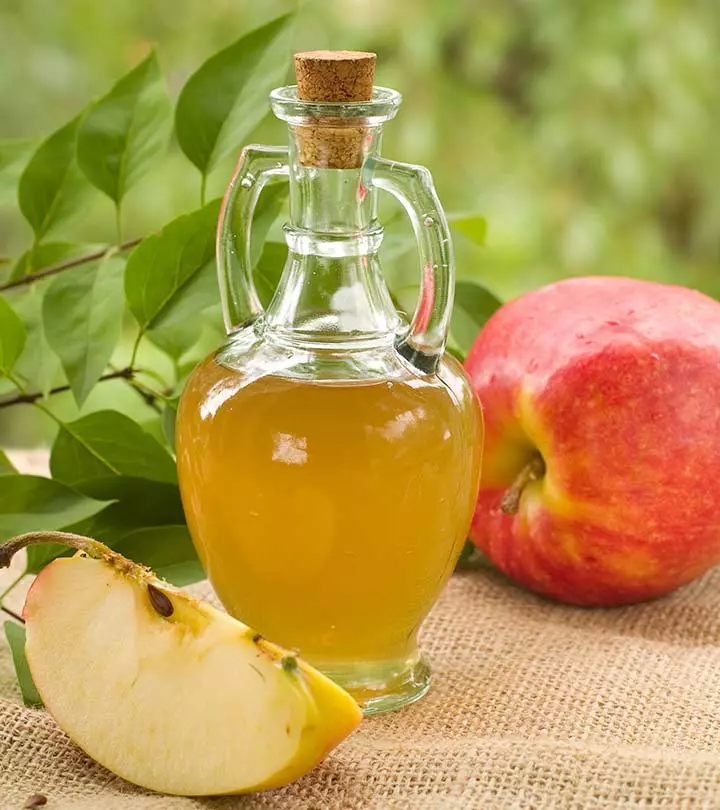
Image: Shutterstock
Apple cider vinegar has been known to help lose weight, reduce cholesterol, and improve digestion. But are you aware that apple cider vinegar is helpful in treating sunburnsi Inflammatory reactions that occur on the topmost skin layers due to ultraviolet damage, leading to redness, irritation, and pain. too? How does apple cider vinegar treat a sunburn? Well, its antimicrobial, anti-inflammatory, and antiseptic properties may help soothe skin and potentially heal sunburn. Are there any downsides of using apple cider vinegar on the skin?
In this article, we explore the various ways you can use apple cider vinegar for sunburn and treat it efficiently. We will also mention the potential risks that you need to be aware of. Keep reading.
In This Article
How Does Sunburn Occur?
Excess exposure of skin to ultraviolet (UV) light can cause sunburn. When you are in the sun, your body protects itself from the UV rays by producing a pigment called melanin. Melanin has free-radical scavengingi The property of fighting free radicals (unstable oxygen molecules) by neutralizing them and protecting the body from chronic harm. activity and helps reduce the UV-induced oxidative stress on the skin (1).
Melanin is found in the outer layer of the skin that gives color to the skin, hair, and eyes. The extra melanin produced by the body when exposed to the sun causes the skin to get tanned (2). This is the body’s natural way of preventing sunburn by blocking the UV rays.
However, if the sun exposure is for a prolonged time, and your skin is not protected by sunscreen, you can get easily sunburned in just 15 minutes of midday sun exposure, especially skin types 1 and 2 (fair skin). The full effect of sunburn may only be seen after 24 to 36 hours from exposure, and it usually heals within three to five days.
A study conducted on 31,162 Americans found that 34.2% had experienced sunburn. It also found that the prevalence rate of sunburn was 42.5% in non-Hispanic White participants, 29.7% in Hispanic participants, and 13.2% in Black participants. Furthermore, the prevalence rate of sunburns in people between 18-29 and people with sun-sensitive skin were 51.2% and 50.2% respectively.
 Quick Tip
Quick TipSo, how does apple cider vinegar work as a treatment option for sunburn? Let us find out in the following section.
Key Takeaways
- Apple cider vinegar has antibacterial, anti-inflammatory, and cooling properties.
- However, before applying apple cider vinegar to your skin for sunburn, you should dilute it.
- Don’t use the vinegar if your burn is serious or you have blisters or open sores.
- Aloe vera, coconut oil, cucumber, baking soda, or tea bags are effective alternatives to treat sunburns.
How Is Apple Cider Vinegar Useful For Sunburns?
The antibacterial and cooling effects of apple cider vinegar have made it a popular choice to treat sunburn (3). ACV also has a high level of pectin that has anti-inflammatory properties (4). Besides, apple cider vinegar contains alpha-hydroxy acids, including lactic and malic acids, which are extensively used in skin care (5).
Gina Reig, a blogger, shared her experience of using apple cider vinegar to treat sunburns and was amazed with the results. She said, “You will be amazed at the difference this makes in both time duration and severity of sun-burn. I have seen this work wonders several times with me, including an awful sunburn obtained when my northern-climate skin experienced TOO MUCH tropical sun this past March (i).”
However, make sure to dilute apple cider vinegar before applying it to your skin. Refrain from using the vinegar if your burn is severe or if you have blisters and open wounds (ACV may further exacerbate the problem).
In the following section, we look at how apple cider vinegar is made. Keep reading.
How Is Apple Cider Vinegar Made?

Apple cider vinegar is fermented apple juice. Firstly, the apples are crushed and squeezed to get the juice, to which bacteria and yeast are added. This causes its natural sugars to ferment and form ethanol.
The ethanol is then fermented for the second time by adding acetic acid-forming bacteria to convert it into vinegar. It is the acetic and malic acids that give the vinegar its sour taste.
Using apple cider vinegar directly may only worsen the sunburn. So, how can you use it safely on sun-damaged skin? Here are a few useful tips.
How To Use Apple Cider Vinegar For Treating Sunburn?
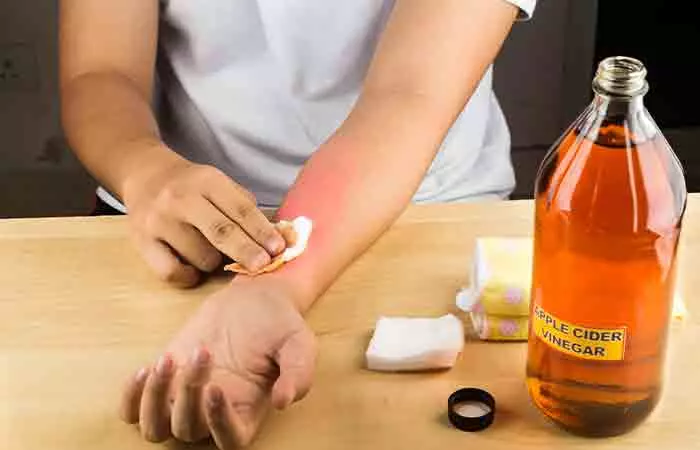
1. Apply To The Affected Area
- Mix an equal amount of apple cider vinegar and water in a bowl.
- Dip a washcloth and wring it out.
- Pat it gently on the affected area.
Alternatively
- You can soak paper towels in the solution and place them on the burned area.
- Remove once the paper towel dries out.
You can repeat this process a few times a day for a few days.
2. Take An Apple Cider Vinegar Bath
- Fill the tub with lukewarm (not hot) water.
- Add a cup of apple cider vinegar and stir.
- Soak for about half an hour.
- Turn on the shower and rinse off. Refrain from using soap to avoid drying your skin out.
3. Use As A Spray
Here is how you can make an apple cider vinegar toner. Fill a spray bottle with apple cider vinegar and water and spray onto your skin. Add a few drops of lavender or chamomile essential oil (optional). You can also refrigerate the mixture for up to 3 weeks.
4. Apply With Cotton Balls
- Soak cotton balls in diluted apple cider vinegar and dab on the affected area.
- This usually works if the affected area is not very large.
- You can also place ice cubes on the affected area afterward for sunburn relief.
These home remedies may offer you some relief. But what do our expert dermatologists have to say about ACV? Keep reading to know.
What Doctors Say About Apple Cider Vinegar
Dermatologists seem to have a divided opinion on the effectiveness of apple cider vinegar in treating sunburns.
Some skin care experts agree that apple cider vinegar remedies are useful in various skin conditions due to its anti-inflammatory and antiseptic properties. However, a few others argue that using vinegar for sunburn might worsen the condition if the burn is severe. Its acidity may irritate extremely sensitive skin, sometimes leading to further redness, dryness, or stringing. Thus, always ensure to do a patch test before topical application to check whether it is a beneficial choice for you for combating sunburn or not. However, for additional reassurance, it’s always a good idea to consult your dermatologist before using ACV, especially if you have a sensitive skin type.
If you are unsure about using apple cider vinegar for your skin to treat sunburns, you can try these alternate remedies. Keep reading!
Other Alternative Remedies For Sunburn
The American Academy of Dermatology recommends taking a cold shower or cooling the skin off with a cold compress to relieve the discomfort of sunburn. Also, using a gentle moisturizer or hydrocortisone creami An anti-inflammatory steroid used to treat a variety of ailments, such as allergic disorders and skin conditions. , or aloe vera gel, and drinking a lot of water will soothe the sunburn (6).
Here are a few other natural remedies you may consider:
- Aloe Vera
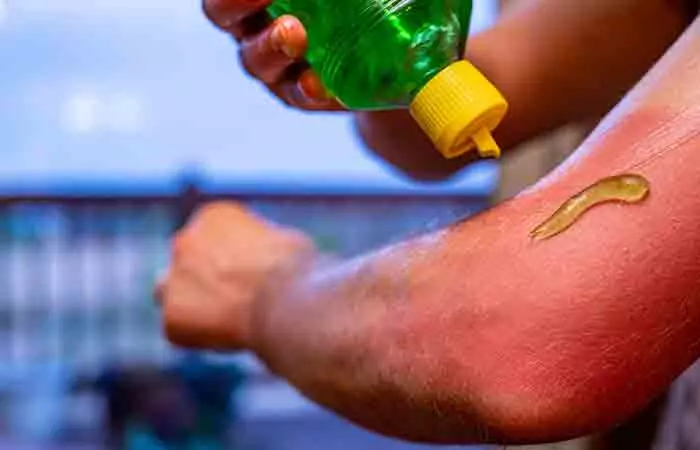
Aloe vera is the most inexpensive way to soothe your skin. You can apply the gel to the affected area directly. However, it only helps soothe the skin and may not treat sunburn (7),(8).
- Coconut Oil
Coconut oil is rich in fatty acids and serves as an excellent moisturizer (9). Applying it to the sunburned skin may help alleviate the associated itching and peeling. To be safe, apply the oil only after cooling the skin. It is best to use organic, virgin coconut oil that has been expeller-pressed.
- Cucumber
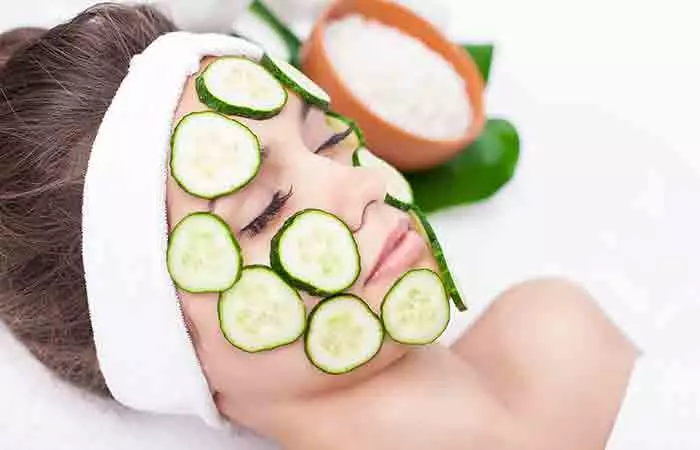
A chilled cucumber has the potential to relieve the pain of sunburn (10).
- Slice a chilled cucumber and lay it on the sunburnt area.
- When the slices heat up, flip them to the cooler side.
You can also blend the chilled cucumber and aloe vera gel in a blender to create a thick paste. Apply it to the sunburnt area for a lasting effect.
- Baking Soda
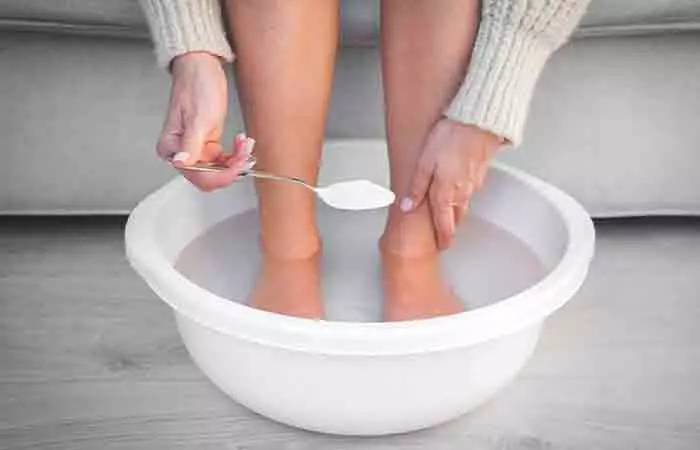
Baking soda possesses antiseptic properties similar to apple cider vinegar, which may help relieve skin irritation (11). Its alkaline nature may also help soothe sunburnt skin.
- Take a few tablespoons of baking soda.
- Add to your bathtub filled with lukewarm water and soak in it for 20 minutes.
 Quick Tip
Quick Tip- Tea Bags
Tea leaves are rich in antioxidants and may help soothe the sunburnt skin.
- Soak some tea bags in cool water. The tannins released help alleviate the irritation and pain.
- Soak a cloth and gently pat on the sunburnt area.
You can also apply the tea leaves directly to your skin. The tannins released from black tea may help reduce adverse skin reactions from UV exposure (12).
- Oatmeal
If you don’t have a soothing lotion or aloe on hand, you can always use oatmeal for sunburns. Oatmeal is a soothing remedy for sunburned skin due to its anti-inflammatory properties (13).
- You can blend colloidal oatmeal into a bathtub with cold water and soak in it, or use it as a compress by soaking a cloth in oatmeal-infused water and applying it to the affected area.
- Alternatively, you can make an oatmeal paste with aloe vera and apply it directly to the sunburnt area for relief.
- Sunburn Relief Essential Oil
Several essential oils, like marigold or tea tree oils, can provide relief from sunburn and help manage the pain. Marigold essential oil possesses anti-inflammatory and antibacterial properties, while tea tree oil helps manage the burning sensation with antifungal and antibacterial properties (14). Dilute these essential oils with any carrier oil of your choice before use to avoid adverse effects.
Infographic: Ways To Use Apple Cider Vinegar For Sunburn
Apple cider vinegar is a common ingredient that is used for various purposes around the home. People include it in their diet for various health benefits like weight loss, improved digestion, etc. However, along with health benefits, it also offers many skin benefits and can be used to treat sunburns. Check out the infographic below to learn how it can help.

Illustration: StyleCraze Design Team
If used in moderation, apple cider vinegar’s healing properties can effectively treat mild sunburn. Undiluted apple cider vinegar, on the other hand, can create a burn of its own. Therefore, you should dilute the vinegar thoroughly before using it. If your skin is blistered and the burn is severe, avoid using vinegar and seek immediate medical help. Of course, the easiest way to avoid sunburn is to avoid it altogether. When going outside, don’t forget your sunscreen. Ensure to avoid the sun between 10 a.m. and 4 p.m., when UV radiation is at its peak
Frequently Asked Questions
Why do sunburns get worse at night?
Sunburns may get worse at night as there could be friction developing between the skin and the bedsheets one sleeps on. This friction may cause irritation and aggravate the pain and discomfort associated with a sunburn.
Does itchy sunburn mean it’s healing?
The itching of sunburn may not always indicate its healing. It also may be caused due to damage to the top skin layer. One can manage this itching with topical lotions or coconut oil.
How should you sleep with a sunburn?
Sleeping with sunburn may be difficult, but having a cold shower before bed, applying prescribed soothing lotions, and wearing loose-fitted clothes can ease the pain.
Is Vaseline good for sunburn?
No, Vaseline is not good for sunburn. It may clog skin pores and block the release of sweat, which may lead to an infection.
Which oil is best for sunburn?
Chamomile and lavender oil can soothe sunburn effectively because of their anti-inflammatory properties.
Illustration: Apple Cider Vinegar For Sunburn: Does It Really Work?
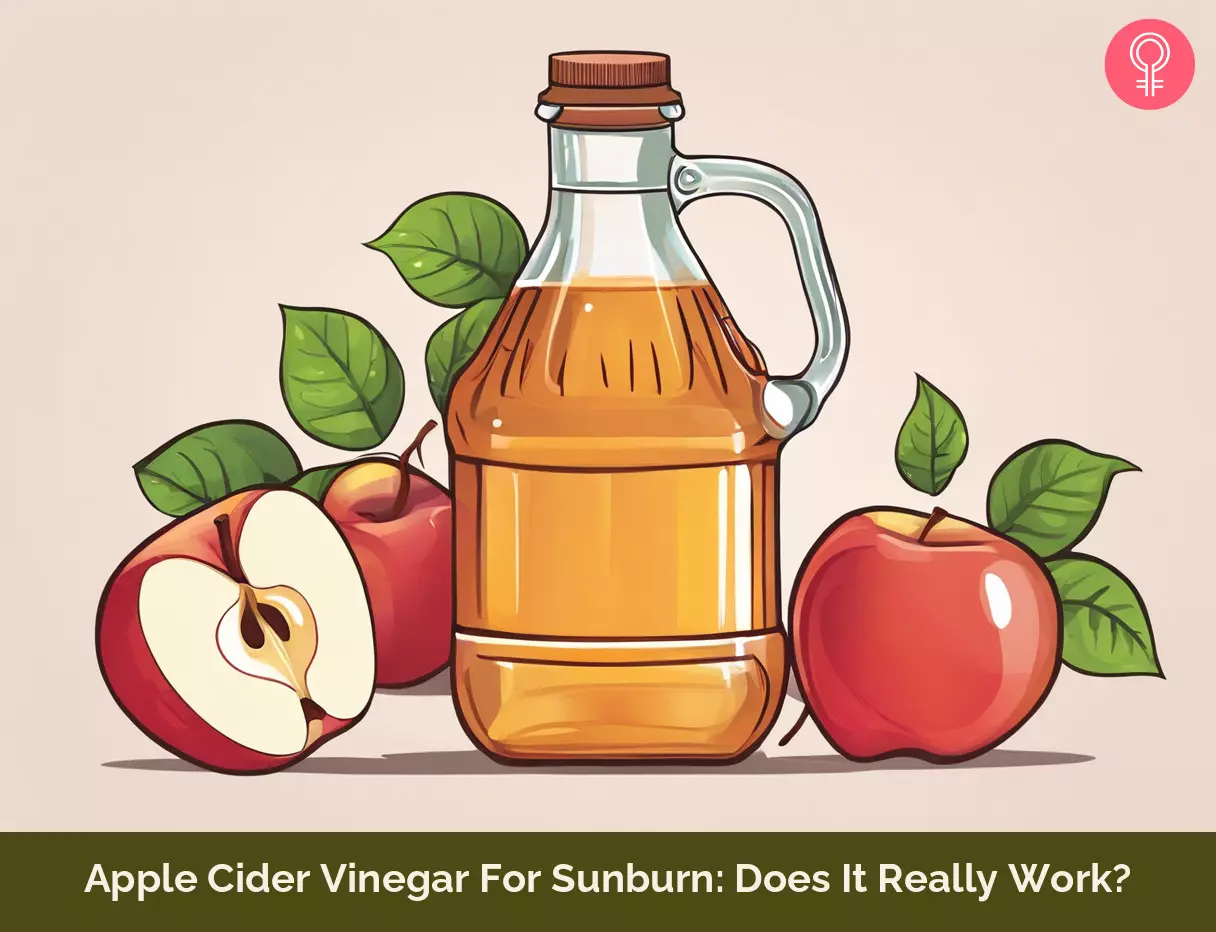
Image: Stable Diffusion/StyleCraze Design Team
Learn how to make your own homemade sunscreen with apple cider vinegar to treat sunburns. Watch this video below and save money while protecting your skin.
Personal Experience: Source
StyleCraze's articles are interwoven with authentic personal narratives that provide depth and resonance to our content. Below are the sources of the personal accounts referenced in this article.
i. Apple Cider Vinegar – Not Just to Consume! Surprising Remedy for Sunburn Healinghttp://www.smileyguthacker.com/References
Articles on StyleCraze are backed by verified information from peer-reviewed and academic research papers, reputed organizations, research institutions, and medical associations to ensure accuracy and relevance. Read our editorial policy to learn more.
- Photoprotection and Skin Pigmentation: Melanin-Related Molecules and Some Other New Agents Obtained from Natural Sources
https://www.ncbi.nlm.nih.gov/labs/pmc/articles/PMC7180973/ - The mathematics of tanning
https://www.ncbi.nlm.nih.gov/labs/pmc/articles/PMC2714304/ - Home Remedy Use Among African American and White Older Adults
https://www.ncbi.nlm.nih.gov/pmc/articles/PMC4631220/ - Pectin Oligosaccharides Ameliorate Colon Cancer by Regulating Oxidative Stress- and Inflammation-Activated Signaling Pathways
https://www.frontiersin.org/journals/immunology/articles/10.3389/fimmu.2018.01504/full - Comparative effectiveness of α-hydroxy acids on skin properties
https://onlinelibrary.wiley.com/doi/abs/10.1111/j.1467-2494.1996.tb00137.x - HOW TO TREAT SUNBURN
https://www.aad.org/public/everyday-care/injured-skin/burns/treat-sunburn - Aloe vera in dermatology: a brief review
https://pubmed.ncbi.nlm.nih.gov/19218914/ - Efficacy of aloe vera cream in prevention and treatment of sunburn and suntan
https://pubmed.ncbi.nlm.nih.gov/16623024/ - In vitro anti-inflammatory and skin protective properties of Virgin coconut oil
https://www.ncbi.nlm.nih.gov/pmc/articles/PMC6335493/ - Phytochemical and therapeutic potential of cucumber
https://pubmed.ncbi.nlm.nih.gov/23098877/ - Home Remedy Use Among African American and White Older Adults
https://www.ncbi.nlm.nih.gov/pmc/articles/PMC4631220/ - Potential of herbs in skin protection from ultraviolet radiation
https://www.ncbi.nlm.nih.gov/labs/pmc/articles/PMC3263051/ - Anti-inflammatory activities of colloidal oatmeal (Avena sativa) contribute to the effectiveness of oats in treatment of itch associated with dry, irritated skin
https://pubmed.ncbi.nlm.nih.gov/25607907/ - Herbal Medicine: Biomolecular and Clinical Aspects. Chapter 18Herbal Treatment for Dermatologic Disorders.
https://www.ncbi.nlm.nih.gov/books/NBK92761/
Read full bio of Dr. Meena Konada
Read full bio of Arshiya Syeda
Read full bio of Ramona Sinha
Read full bio of Shiboli Chakraborti






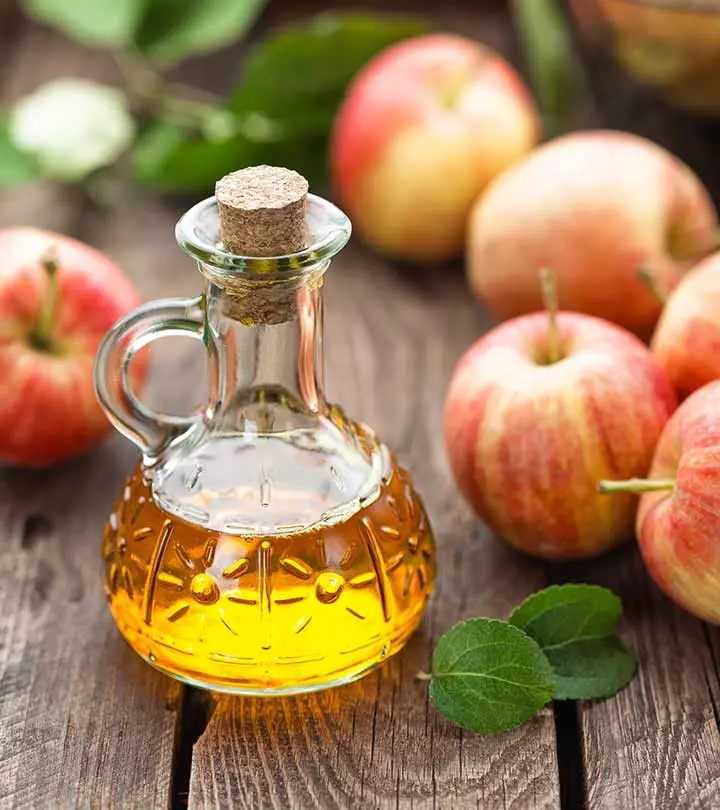

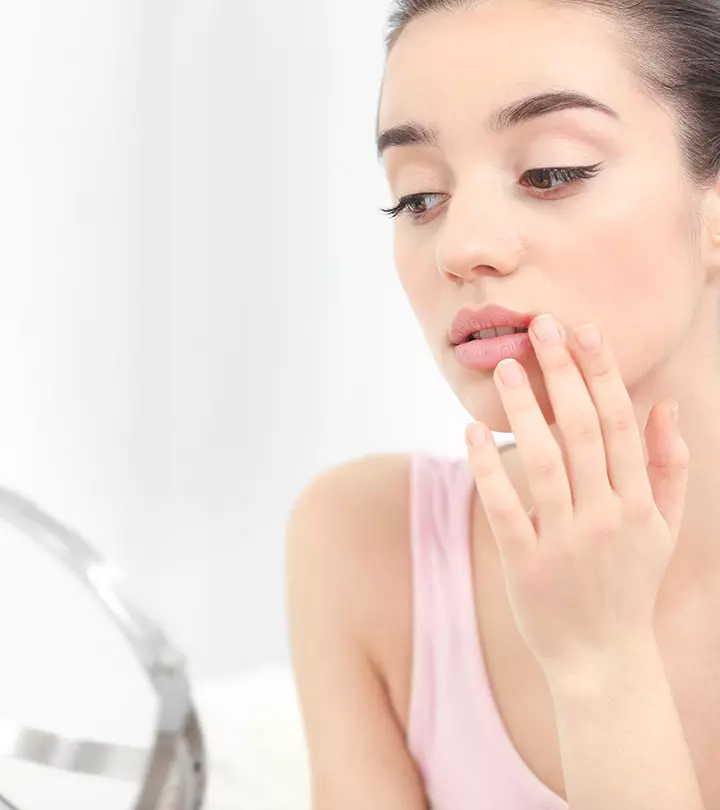
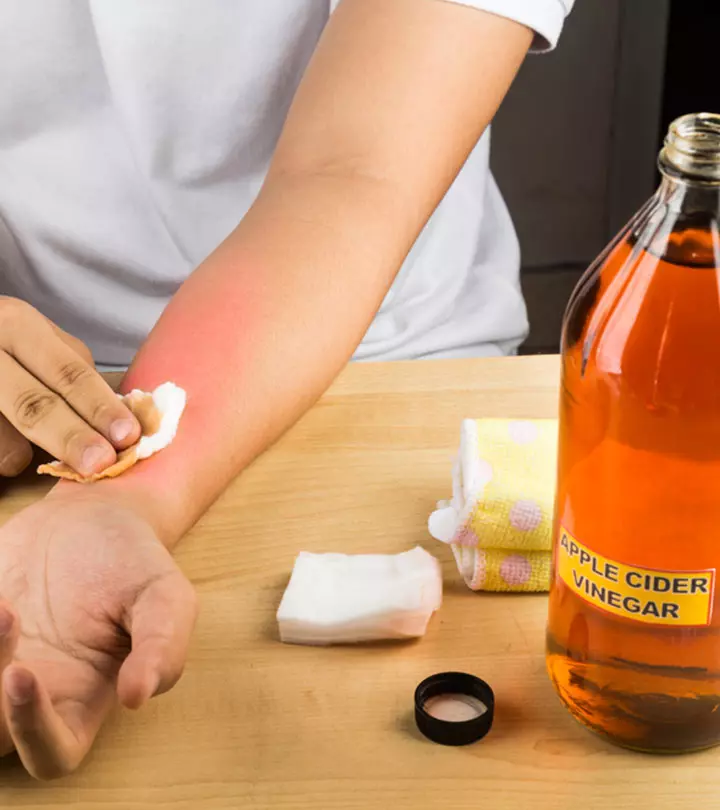
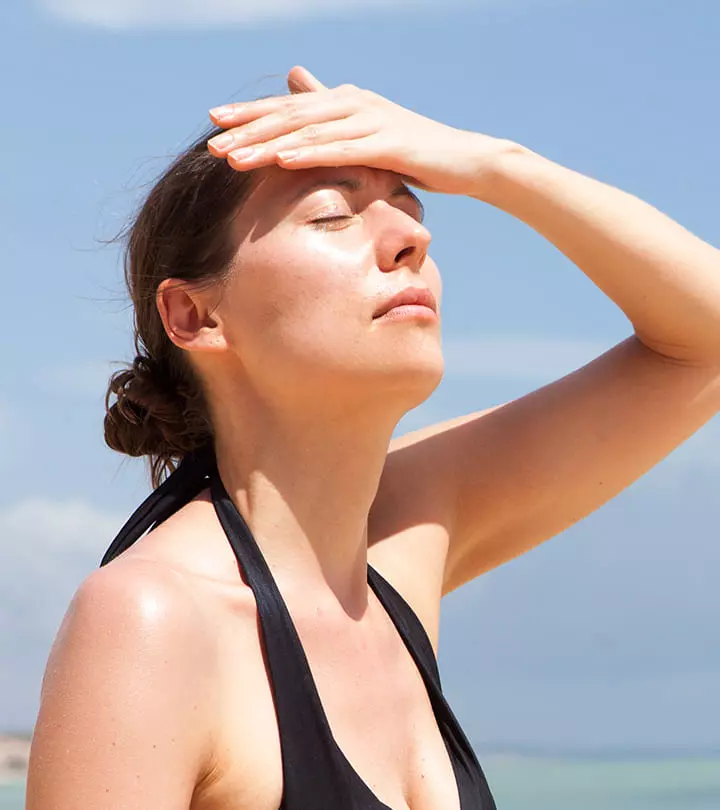
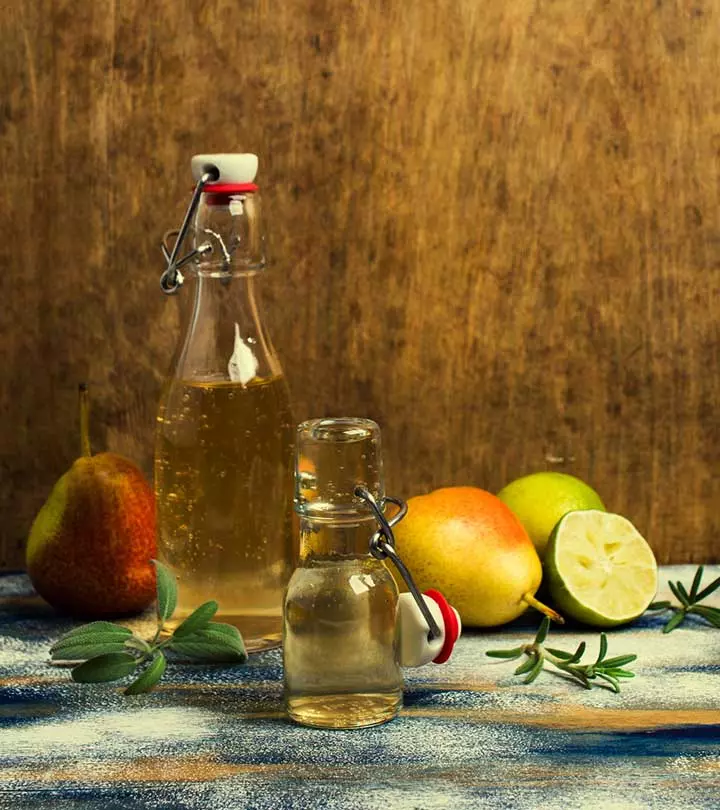




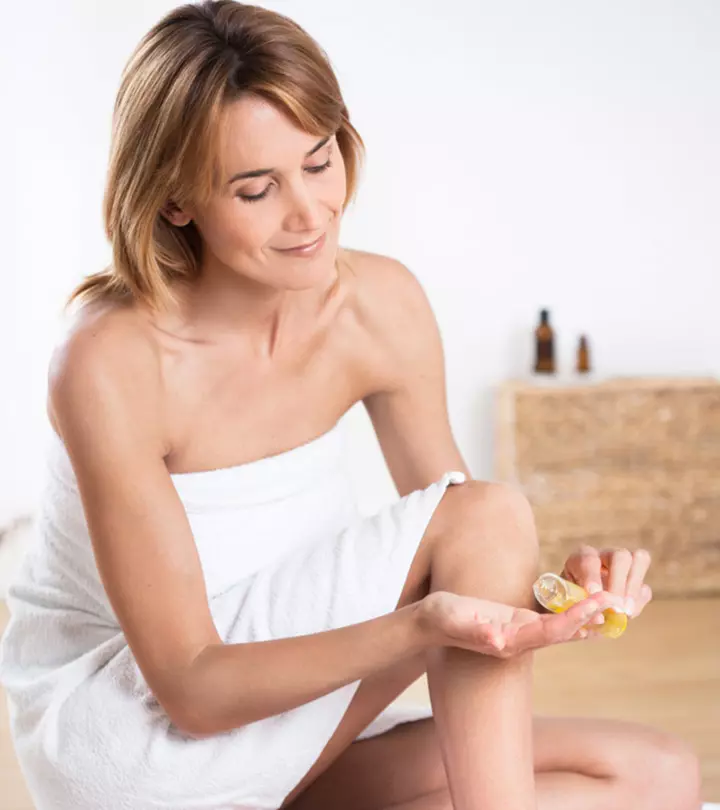
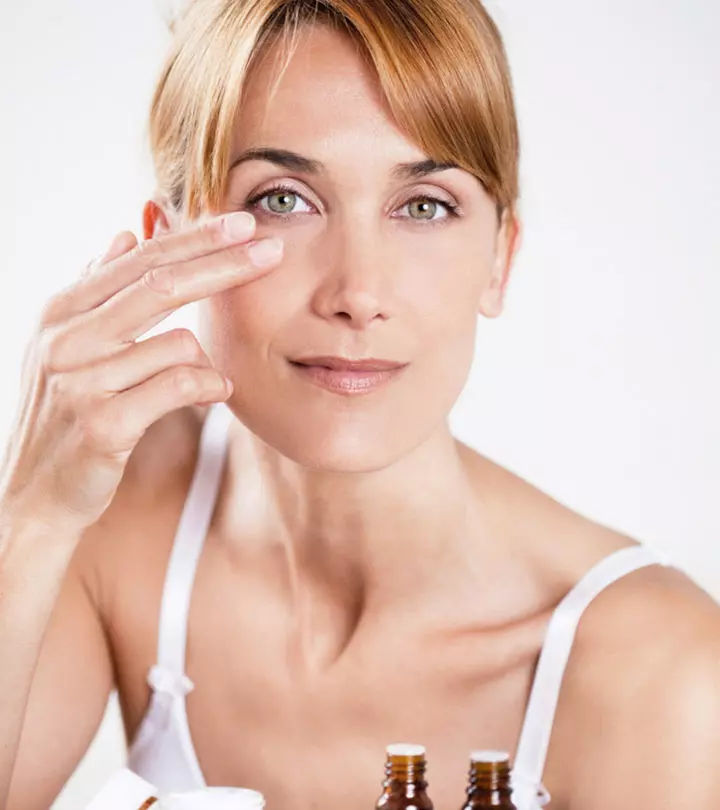

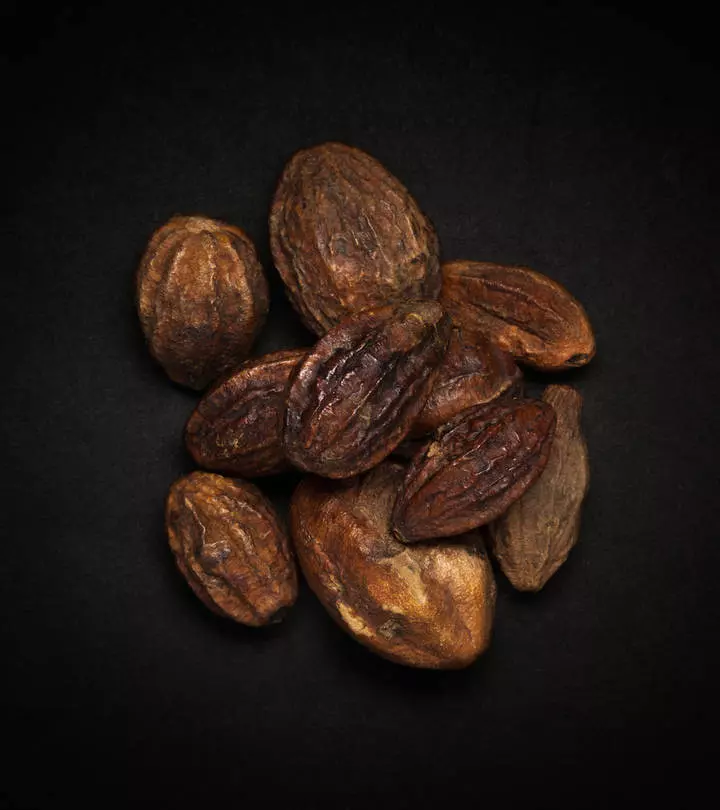
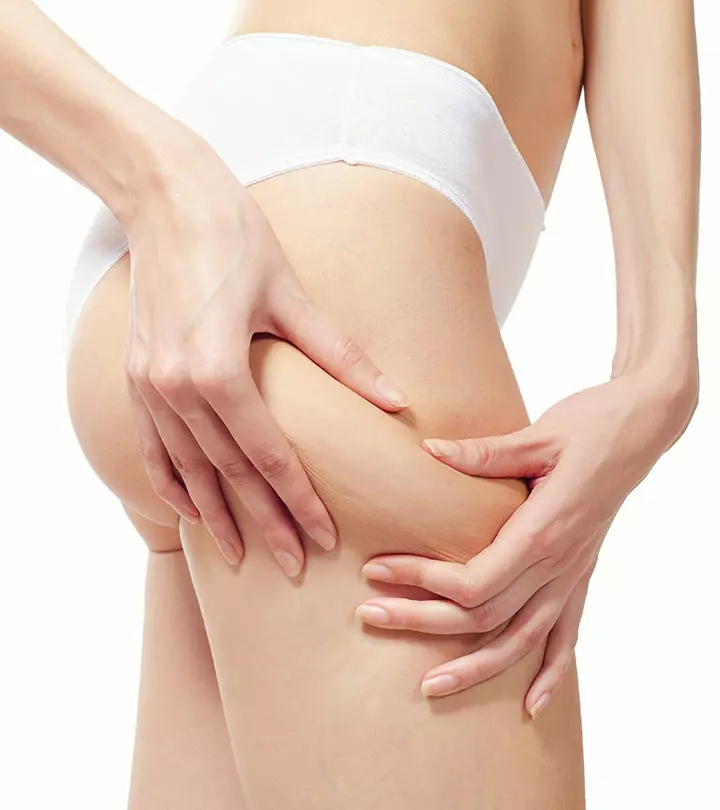

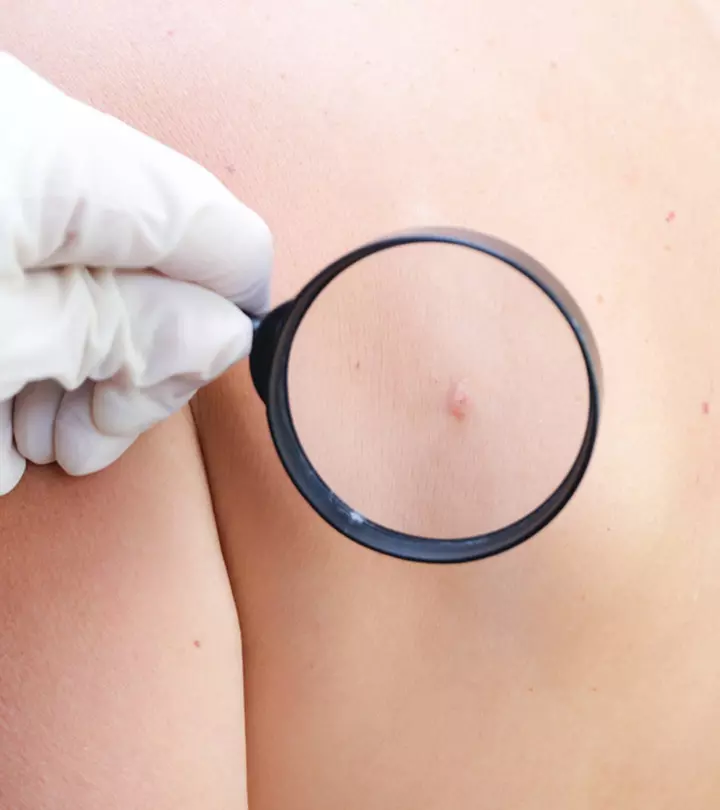


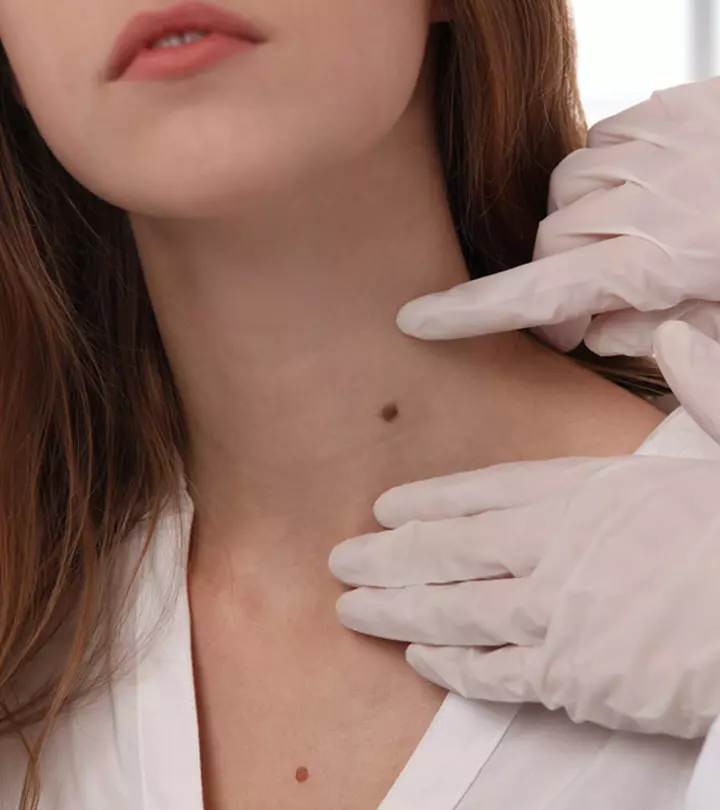

Community Experiences
Join the conversation and become a part of our empowering community! Share your stories, experiences, and insights to connect with other beauty, lifestyle, and health enthusiasts.